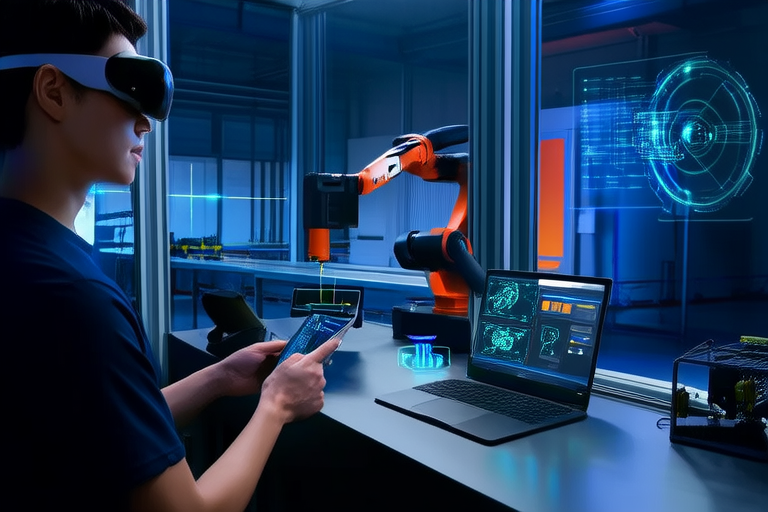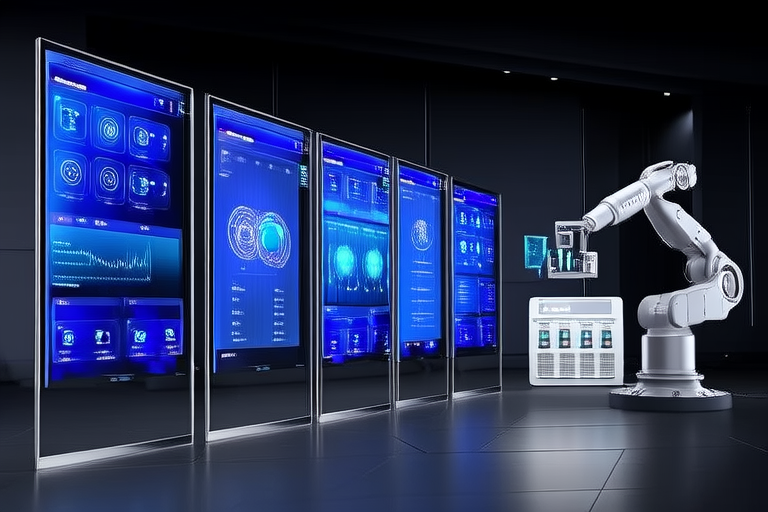Revolutionizing Industries: The Impact of AI Across Various Sectors
Introduction
Artificial Intelligence (AI) has emerged as a transformative force in today’s world, reshaping industries and driving unprecedented levels of innovation. From healthcare to finance, manufacturing to retail, AI is enhancing efficiency, accuracy, and creativity across a wide array of sectors. This article explores the profound impact of AI, highlighting its applications and potential benefits in various industries.
The integration of AI technologies is not just a technological advancement but a strategic shift that promises to redefine how businesses operate and interact with their customers. By leveraging machine learning, natural language processing, and advanced algorithms, AI is enabling industries to tackle complex challenges, streamline operations, and unlock new opportunities for growth.
Section 1: Healthcare
In the healthcare sector, AI is revolutionizing diagnostics, treatment, and patient care. Diagnostic tools powered by AI can analyze medical images with greater precision than human radiologists, reducing errors and speeding up diagnosis times. Personalized medicine, driven by AI, tailors treatments to individual patient profiles, improving outcomes and reducing side effects.
Predictive analytics enable healthcare providers to forecast disease outbreaks, optimize resource allocation, and enhance patient care. For instance, AI is used in robotic surgery to assist surgeons with precision and speed, while AI-driven drug discovery accelerates the development of new medications. Patient monitoring systems equipped with AI can detect anomalies in real-time, ensuring timely interventions.
The benefits extend beyond improved patient outcomes. AI helps healthcare providers manage resources more efficiently, reduces costs, and enhances overall system performance. As AI continues to evolve, it holds the promise of making healthcare more accessible and affordable for everyone.
Section 2: Finance
The finance industry is increasingly adopting AI to enhance fraud detection, improve risk management, and optimize trading strategies. AI algorithms can analyze vast amounts of data in real-time, identifying patterns and anomalies that might indicate fraudulent activities. This capability significantly reduces the likelihood of financial crimes and ensures the integrity of transactions.
Algorithmic trading, powered by AI, enables traders to execute trades at optimal times, maximizing profits and minimizing risks. AI also plays a crucial role in customer service through chatbots and virtual assistants, providing instant responses to queries and enhancing user experience. Financial institutions are leveraging AI to offer personalized financial advice and wealth management services, helping clients make informed decisions.
Advancements in AI-driven tools are also transforming financial planning and wealth management. These tools can analyze market trends, predict future performance, and recommend investment strategies tailored to individual preferences and risk tolerance. As AI continues to evolve, it will play an even more pivotal role in shaping the future of finance.
Section 3: Manufacturing
AI is revolutionizing manufacturing by introducing automation, predictive maintenance, and advanced quality control measures. Robots equipped with AI can perform repetitive tasks with precision, increasing productivity and reducing errors. Predictive maintenance uses AI to monitor equipment health in real-time, predicting failures before they occur and minimizing downtime.
AI-driven supply chain optimization and inventory management ensure that manufacturers have the right materials at the right time, reducing waste and improving efficiency. Companies like General Electric and Siemens are already leveraging AI to enhance their manufacturing processes, resulting in significant cost savings and improved product quality.
Real-world examples illustrate the transformative power of AI in manufacturing. For instance, BMW uses AI to optimize production lines, reducing setup times and increasing throughput. Similarly, Amazon employs AI to manage its vast warehouse operations, ensuring efficient order fulfillment and delivery.
Section 4: Retail
The retail industry is embracing AI to enhance customer experiences, improve demand forecasting, and optimize inventory management. AI-powered recommendation engines analyze customer behavior and preferences, offering personalized product suggestions that increase sales and customer satisfaction. Demand forecasting, enabled by AI, helps retailers anticipate trends and adjust stock levels accordingly, reducing overstocking and shortages.
AI-driven chatbots and virtual assistants provide instant customer support, answering queries and resolving issues quickly. In logistics and delivery, AI optimizes routes, ensuring timely and efficient deliveries. Companies like Amazon and Alibaba are at the forefront of integrating AI into their retail operations, providing seamless shopping experiences for customers.
As AI continues to evolve, it will play an even more critical role in shaping the future of retail, enabling businesses to stay competitive and responsive to changing consumer demands.
Section 5: Education
AI is reshaping education by introducing adaptive learning platforms, intelligent tutoring systems, and personalized learning paths. Adaptive learning platforms use AI to tailor educational content to individual student needs, enhancing engagement and improving learning outcomes. Intelligent tutoring systems provide real-time feedback and guidance, helping students master concepts at their own pace.
AI also automates administrative tasks, freeing up teachers’ time for more impactful activities. Virtual classrooms and remote learning platforms, powered by AI, ensure that students receive high-quality education regardless of their location. As AI continues to evolve, it will play an increasingly important role in transforming the education sector, making learning more accessible and effective for all.
Section 6: Transportation
The transportation industry is being transformed by AI through advancements in autonomous vehicles, traffic management, and logistics. Autonomous vehicles, powered by AI, promise to reduce accidents, improve fuel efficiency, and enhance passenger comfort. Traffic management systems use AI to optimize traffic flow, reducing congestion and travel times.
Logistics companies are leveraging AI to optimize routes and delivery schedules, ensuring timely and efficient shipments. Cities like Singapore and San Francisco are at the forefront of integrating AI into their transportation systems, creating smart cities that prioritize sustainability and efficiency. As AI continues to evolve, it will play an even more critical role in shaping the future of transportation.
Conclusion
The impact of AI across various sectors is undeniable, offering immense potential for innovation and growth. From healthcare to finance, manufacturing to retail, and education to transportation, AI is transforming industries in ways that were once unimaginable. By enhancing efficiency, accuracy, and creativity, AI is enabling businesses to tackle complex challenges and unlock new opportunities.
As we look to the future, the continued integration of AI will drive further innovation and growth in industries. However, it is essential to address the ethical considerations and challenges associated with widespread AI adoption. Ensuring transparency, fairness, and accountability in AI systems will be crucial to realizing the full potential of this transformative technology.
The future of AI is bright, and its impact will continue to shape the world in profound ways. As we embrace this technology, let us do so with a commitment to responsible and ethical practices, ensuring that AI benefits everyone.




